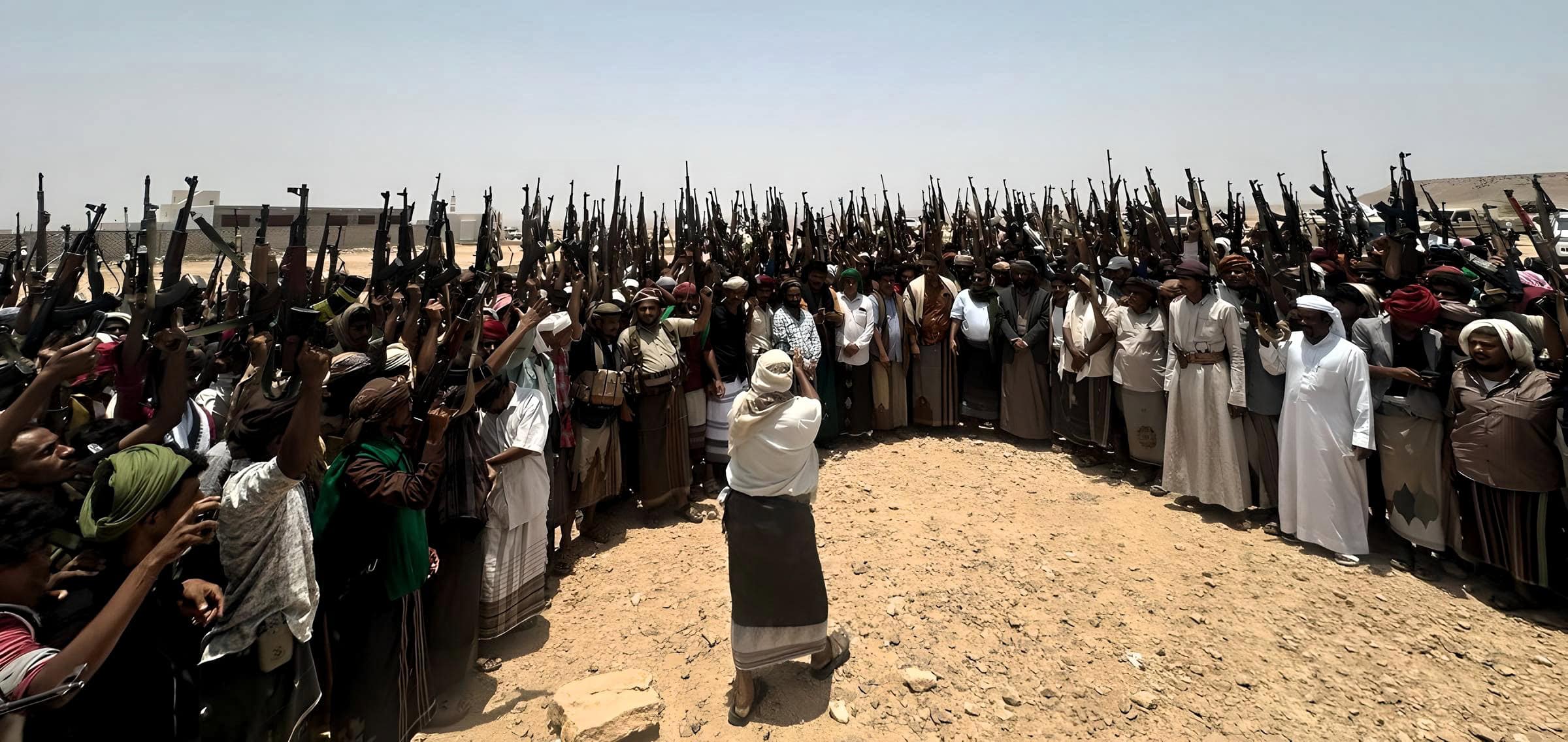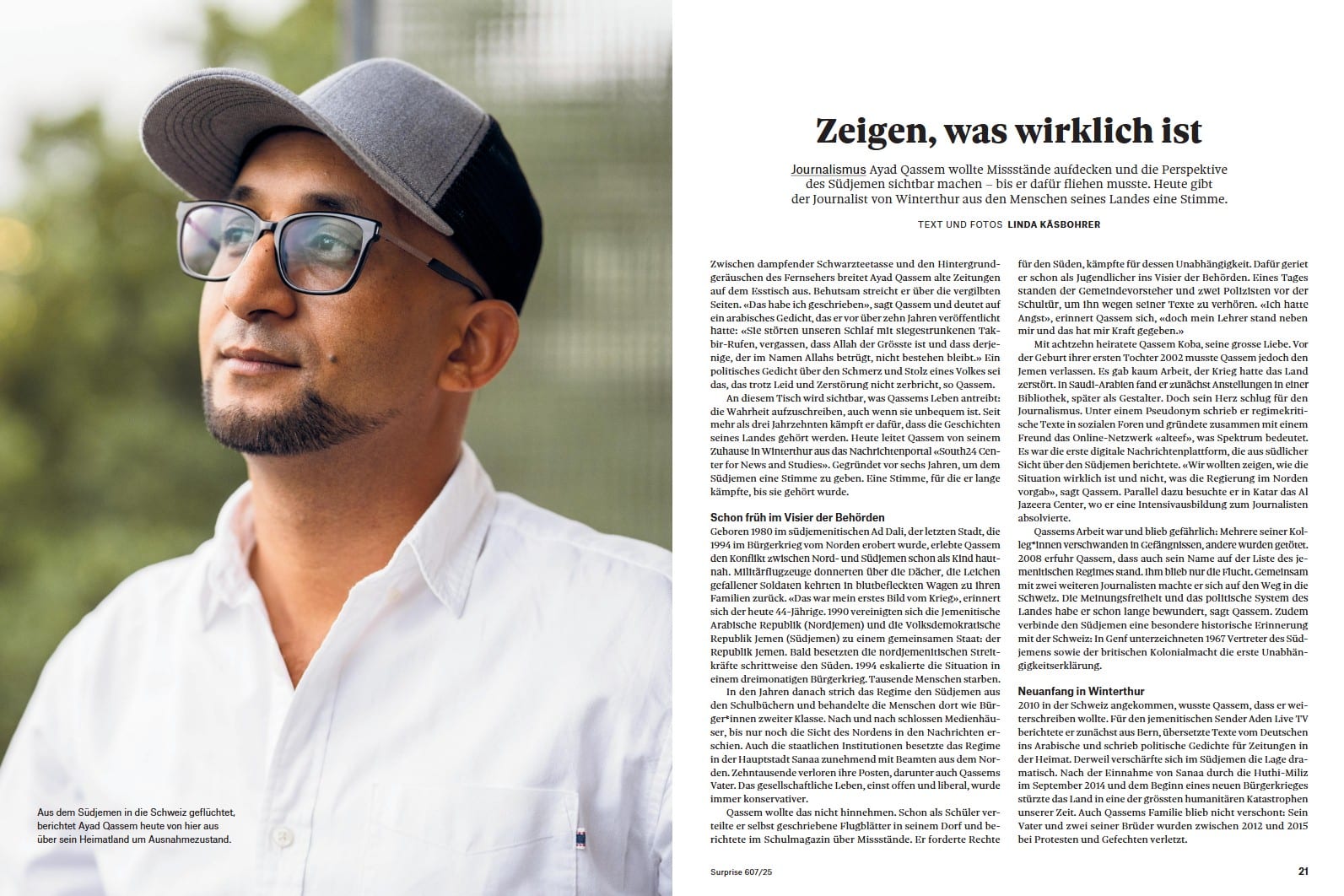
Tribal gunmen in Hadramout's Hadhaba region (activists)
آخر تحديث في: 09-08-2024 الساعة 7 مساءً بتوقيت عدن
Hadramout (South24)
The tribes of Hadramout in South Yemen are intensifying their efforts to control local oil resources following the expiration of a deadline given to the central government and local authorities to meet service and economic demands.
The Hadramout Tribal Alliance, led by Sheikh Amar Bin Habresh, announced the arrival of new tribal delegations to Hadramout's Hadhaba region today, joining the escalation from different regions.
A local source told South24 Center that the tribes had set up several armed checkpoints near the Al-Masila oil area. The source added that more checkpoints are being set up after the arrival of hundreds of armed tribesmen.
The Hadramout General Conference, a prominent political faction in Hadramout also headed by Amar Bin Habresh, had issued a 30-day ultimatum to local authorities on July 13 to implement several demands. These included improving services, resolving electricity issues, disclosing oil revenue figures, and ensuring the governorate receives its full share.
However, the situation escalated with the visit of Rashad Al-Alimi, the Chairman of Yemen's Presidential Leadership Council, to Hadramout on July 27. On July 31, the Hadramout Tribal Alliance announced the expansion of the demands, giving a 48-hour deadline for their implementation.
The Alliance’s statement demanded that the Inclusive Hadramout Conference’s demands be met, warning that the tribes would extend their control over oil resources if they were not.
"We consider the current oil reserves in the tanks of the ports of Dabbah and Masila to be the right of Hadramout, and we will not give it up, provided that its full value is used to purchase electricity for the governorate," the statement added.
The deadline passed without a response, and Al-Alimi departed Hadramout on a private Saudi plane on August 4, returning to Riyadh.
An informed source told the South24 Center that Hadramout tribes were concerned Al-Alimi's visit was linked to a plan to push forward the roadmap between Saudi Arabia and the Houthi militia, which includes resuming oil exports and allocating a share to the militia.
During his visit, Al-Alimi promised residents a new 50-megawatt power station on the Coast of Hadramout, and another of the same capacity in Wadi Hadramout, funded jointly by the central government and local authority.
On Thursday, the local authority in the governorate held a meeting with tribal, civil, military, and political figures in the coastal city of Mukalla.
The Governor of Hadramout, Mabkhout bin Madi, expressed support for the tribes' demands but called for unity on the internal front and for sparing the governorate from conflict. He admitted that his administration faces a major financial crisis due to the halt in oil exports since October 2022 following Houthi attacks.
Yesterday, the Southern Transitional Council's office in Hadramout declared it would not allow the occupation of the oil wealth in the Wadi regions and called for the immediate withdrawal of the Northern military forces of the First Military District.
Hadramout, the largest governorate in South Yemen, is rich in oil reserves along with Shabwa Governorate. In recent years, the region has witnessed intense local, regional, and international competition.
Preventive measures
Hadrami analysts believe that the tribes’ moves are proactive and preventive measures against any political deals that might target Hadramout’s oil resources without considering the interests of the local population in the governorate specifically and South Yemen, in general.
In this regard, Dr. Omar Bajardana, the Chairman of the Knowledge Center for Studies and Strategic Research, told South24 Center that “Al-Alimi’s visit reveals a Saudi desire to accelerate the pace of the roadmap, with a special focus on resuming oil exports and sharing its revenues between the legitimate government and the Houthis.
He added, “In the coming period, we are likely to see increased pressure on the Yemeni Presidential Leadership Council to approve the Houthis’= demands, including ensuring a share of oil revenues.”
Bajardana didn’t rule out Saudi Arabia resorting to changing the PLC structure to suit its bilateral plan with the Houthis, potentially weakening PLC members who oppose the move or have reservations against it.
Journalist Walid Al-Tamimi concurs, stating that Al-Alimi’s visit was likely aimed at coordinating with local authorities to resume oil exports that have been halted since the Houthi missile attack on the Port of Al-Dabba. He added, “It seems Al-Alimi sought to convince the authorities that any political settlement to the crisis would involve the Houthis as partners in sharing oil revenues”.
Al-Tamimi believes the actions of the Hadramout Tribes Alliance, also known as the Hadramout Tribes Confederacy, thwarted Al-Alimi’s visit. “The tribes sent a strong message to all parties that the Hadramis will not accept any peace agreement that ignores their will or returns them to the pre-2014 status, draining their resources.”
Ongoing escalation
Spokesman for the Hadramout Tribes Confederacy, Al-Kash Saeed Al-Saeedi, told South24 Center that their escalation moves are ongoing and steady, even after Rashad Al-Alimi’s departure. He stated, “The Hadramout Tribes Confederacy and the Inclusive Hadramout Conference are planning further escalation across all districts of Hadramout”.
Al-Saeedi outlined the demands of the Hadramout Tribes Confederacy, including “Hadramout’s participation in the settlement process, self-governance, rightful development benefits, elimination of corruption, and a fair share of oil revenues that reflects its wealth and significance ”.
The position of the Southern Transitional Council (STC)
Brigadier General Saeed Al-Mohammadi, head of the STC in Hadramout speaking to South24 Center exclusively, said that “sharing wealth with the Houthi militias is categorically rejected”.
He added, “The STC, represented by its president Aidrous Al-Zubaidi, has consistently affirmed that the resources of the South belong to its people. He supports the efforts and strife of Hadramis to manage their own wealth and run the affairs of their country within the framework of the Federal South project”.
Al-Mohammadi stressed that “the STC will not accept any arrangements that would weaken the rights of Hadramout or limit its people’s control over their natural resources”.
Although Al-Mohammadi did not explicitly state the STC’s position toward the Hadramout Tribes Alliance's actions, Bin Habresh, the alliance’s leader, received a phone call on August 2 from Major General Ahmed Saeed Bin Break, the STC Vice President, who expressed full solidarity and support.
Hadramout is the largest governorate in South Yemen, rich in oil resources along with Shabwa. The governorate has witnessed intense local, regional, and international competition in recent years.
Various popular movements have emerged over the past few years, focusing on key demands such as improving services and the economy, preventing oil looting, and expelling Northern forces within the scope of the First Military District in Hadramout Valley.
By Abdullah Al-Shadli, Jacob Alsufyani

قبل 3 أشهر

قبل 3 أشهر